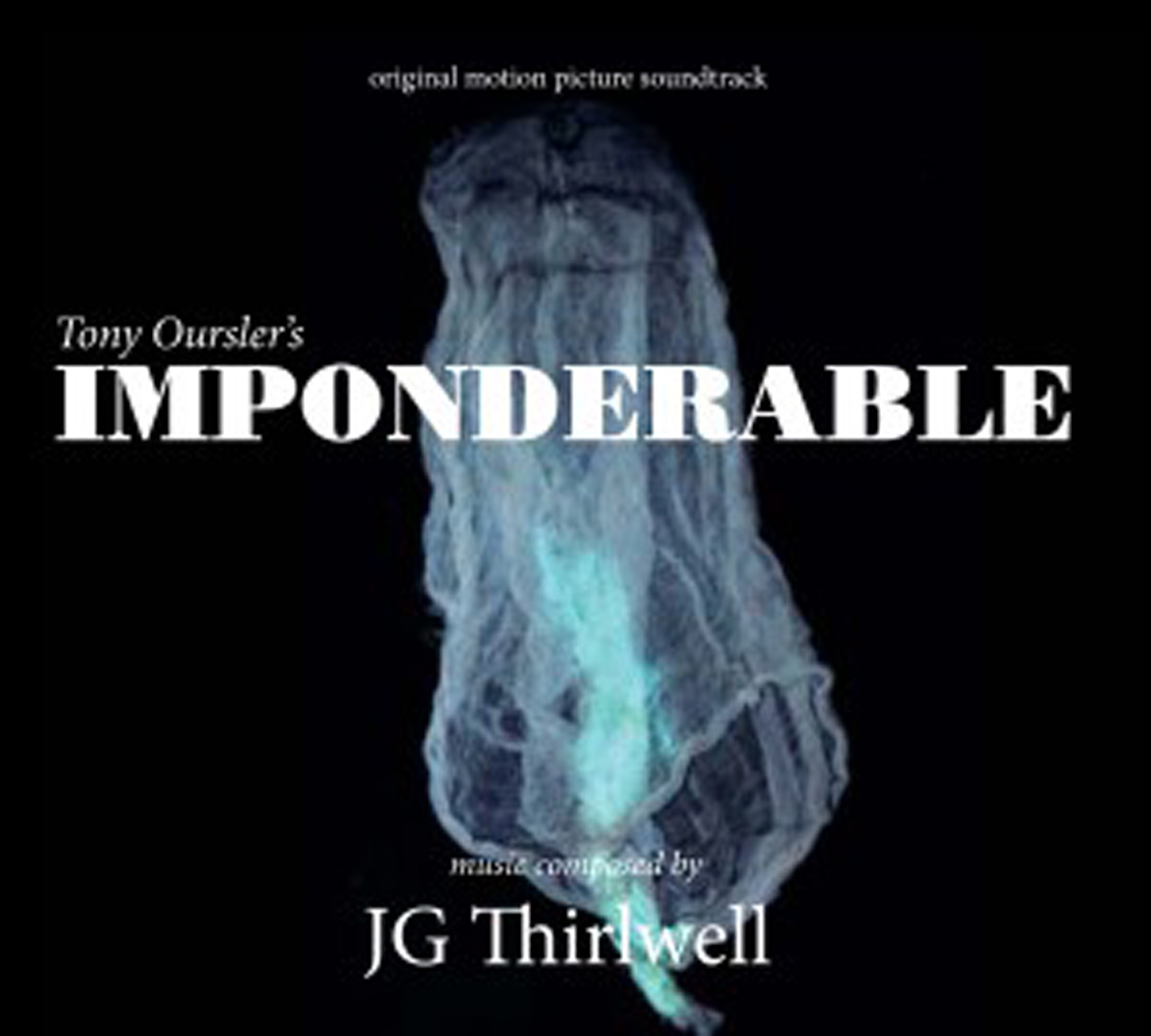JG Thirlwell, "Imponderable OST"
 I had absolutely no idea what to expect from Jim Thirlwell’s latest opus, as I am still a bit shell-shocked from the overwhelming maximalism of 2013’s Soak and all bets are off with soundtrack work.  Also, Tony Oursler's Imponderable is quite a bizarre film by any standards.  Appropriately, the soundtrack is quite bizarre as well, though it is considerably more understated, melodic, and tender than I had anticipated: Thirlwell's eerie, dark, and eclectic vision beautifully mirrors the film’s own noirish pulp-meets-hallucinatory experimentation aesthetic.  Both Oursler and Thirlwell definitely share a puckish appreciation for the nexus where garish "low" art collides with higher, more cerebral fare.  That said, Imponderable is still a soundtrack rather than an original new stand-alone Thirlwell album, so its appeal is very "niche."  Devout Thirlwell fans will definitely not want to miss it though, as it is quite a unique release that takes his aesthetic in some unusual and surprising directions.
I had absolutely no idea what to expect from Jim Thirlwell’s latest opus, as I am still a bit shell-shocked from the overwhelming maximalism of 2013’s Soak and all bets are off with soundtrack work.  Also, Tony Oursler's Imponderable is quite a bizarre film by any standards.  Appropriately, the soundtrack is quite bizarre as well, though it is considerably more understated, melodic, and tender than I had anticipated: Thirlwell's eerie, dark, and eclectic vision beautifully mirrors the film’s own noirish pulp-meets-hallucinatory experimentation aesthetic.  Both Oursler and Thirlwell definitely share a puckish appreciation for the nexus where garish "low" art collides with higher, more cerebral fare.  That said, Imponderable is still a soundtrack rather than an original new stand-alone Thirlwell album, so its appeal is very "niche."  Devout Thirlwell fans will definitely not want to miss it though, as it is quite a unique release that takes his aesthetic in some unusual and surprising directions.
It goes without saying that Jim Thirlwell is an interesting guy who chooses interesting projects, but teaming up with Tony Oursler seems like an especially perfect marriage.  By coincidence, I found myself in NYC over the weekend, so I was able to catch a bit of Imponderable at MoMA, its current home.  I am curious to see if takes up residence anywhere else, as it has some interesting technical demands that prohibit it from playing in a regular theater. More specifically, it is "presented in a "5-D" cinematic environment utilizing a contemporary form of Pepper’s ghost—a 19th-century phantasmagoric device—and a range of sensory effects (scents, vibrations, etc.)."  I personally did not find the occasional red houselights or wafts of perfume to be especially crucial to the experience, but it is easy to see how the artist might feel differently.  Vibrating floors and scent infusions aside, Imponderable is a one-of-a-kind film just from its subject matter alone, as it is a complexly layered fantasia on director Tony Oursler's family history mingled with his longtime fascination with "stage magic, spirit photography, pseudoscience, telekinesis, and other manifestations of the paranormal."  The overall effect is unpredictable and disorienting in the extreme, as it feels like watching weirdly stage-y and stilted reenactments of multiple unfamiliar films while deeply in the throes of an acid trip.
Appropriately, Thirlwell’s soundtrack is similarly kaleidoscopic and phantasmagoric, flitting seamlessly from squelching and goopy vintage synth kitsch ("Symphony VII, Part II") to jaunty accordion romps ("Giggle Water") to gorgeous, exotic reveries ("Chinese Ghost").  The album’s centerpiece, however, is the comparatively lengthy "Spark of Life," an oasis of lush and darkly Romantic balladry amidst a wilderness of eclectic instrumentals.  Though it admittedly boasts a few over-the-top goth/theatrical tropes (church bells, a raspy throat gurgle) and very film-specific lyrics ("automaton will rise again"), Thirlwell’s tenderly incantatory vocals elevate it into something quite haunting and compelling.  Hearing an actual, naked human voice intrude into an album that otherwise sounds like a bizarre B-movie fever dream is quite striking.  I actually like all of the longer pieces quite a bit though, as Thirlwell seems to be at his most outré and inspired when he has a few minutes to stretch out.  In "Night Nurse," for example, he manages to find room for an interlude of strangled strings, a drone segment featuring eerily quivering feedback, and a darkly hallucinatory music box coda.  Elsewhere, he embarks upon a beautifully lush and melancholy reverie in "Faerie Bust" and deftly condenses all of the album’s disparate themes into a single piece with "The History of Magic."  I also quite liked the brief "Demonologia," as its gnarled, industrial-damaged collage aesthetic is much closer to my personal sensibility than the rest of the album.
Generally, my problem with soundtracks is that I just do not understand why they exist or why anyone would want to listen to music that is disembodied from its intended context.  I recognize that that is a harsh stance, but the whole point of a soundtrack is to provide color and mood for a more complex and layered whole without being intrusive or stealing the focus.  As such, soundtracks are fundamentally not meant to stand alone.  That said, I am not a crazy person, so I acknowledge that some soundtracks transcend their original intent.  The Imponderable score arguably does just that: while it is too closely thematically tied to what is on the screen to exist as a completely independent entity, it is also far too vivid and rich for its only life to be as a mere backdrop.  As I was watching Imponderable, I appreciated how beautifully the underlying music enhanced the scenes, but realized that it is probably very easy to watch the entire film without ever noticing the sheer depth, breadth, and imagination of Thirlwell’s score, which is definitely its own singular work of art.  That seems criminal, so I am delighted that this window into Thirlwell’s skewed genius remains open for me to explore at my leisure.
 



